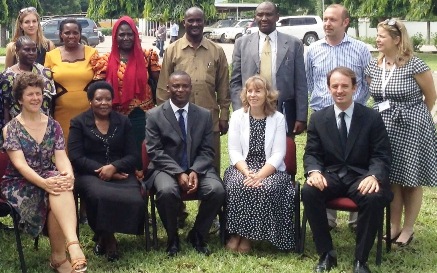 Tanzania's founding father Mwalimu (Swahili teacher) Julius Nyerere was certainly both erudite and multi-lingual; as he guided his country to independence in the 1960s he translated Shakespeare's Merchant of Venice and Julius Caesar into Swahili in his spare time. He was also a passionate believer that all Tanzanians should speak and be literate in Swahili, it has been suggested that the ability to adequately express such rich works as Shakespeare in Swahili, gave him the strength to resist pressure to adopt English as the national language.
Tanzania's founding father Mwalimu (Swahili teacher) Julius Nyerere was certainly both erudite and multi-lingual; as he guided his country to independence in the 1960s he translated Shakespeare's Merchant of Venice and Julius Caesar into Swahili in his spare time. He was also a passionate believer that all Tanzanians should speak and be literate in Swahili, it has been suggested that the ability to adequately express such rich works as Shakespeare in Swahili, gave him the strength to resist pressure to adopt English as the national language.
Swahili since then has been used as the language of instruction through pre-school and seven years of primary education, leaving students with a difficult transition to English medium instruction as they enter Form I of secondary school around the age of 14. As I've recently posted the rapid expansion of secondary schooling in Tanzania (enrolment tripled in the past 7 years) has exacerbated this problem with many new secondary schools, teachers and students unable to cope.
The large drop in secondary Form IV examination results for 2012 led to the Prime Minister establishing a special probe (commission) into the reasons why; the nation awaits with interest the findings. The standard of English in teaching is a factor likely to be cited in the report, together with complaints about a dysfunctional system that has over-expanded and has under qualified, demotivated teachers. Tanzanians were surprised however that prior to the probe reporting fully, the first concrete action taken by government on the matter was to annul all Form IV candidates’ results and demand that the exam board NECTA re-grade them according to the system used previously, which puts greater emphasis on continuous assessment marks that many believe are inflated.

This topic is likely to remain hot for some time, but meanwhile it was pleasing last week to join Tanzanian Minister of Education, Dr. Shukuru Kawambwa at the launch of a new English Language Training programme that DFID is funding. Being implemented by two of our most trusted partners: the British Council and VSO, we hope this can have a lasting impact on improving English language competencies and the ability of secondary school students in Tanzania to effectively learn. Expert tutors and volunteers will directly work with all of the 34 Tanzanian public teacher colleges to improve tutors and trainee teachers’ pedagogic skills and ensure that each year all 400,000+ new Form 1 students starting secondary school receive a foundation English language readiness course - Baseline.
Switching to use of a second language is daunting, I managed to fumble my way through a self-introduction in Swahili at the launch, but nobody expects me to use it fluently in my regular work, as many Tanzanians must try to. Minister Kawambwa was pleased to meet student teachers from nearby Vikindu College at the launch, they were already eager to showcase their confidence in English as they described their hopes and ambitions for the future.
As language skills improve, Shakespeare's classic insult of Gratianio in the Merchant of Venice, “You speak an infinite deal of nothing”, will hopefully never be a relevant description of the classrooms of Tanzania!


6 comments
Comment by Joseph Payne posted on
Given the political nature of the language of instruction debate in Tanzania, I am sure this is a very worthwhile project.
Liz Tayler mentions in her speech that "to select the language of instruction...is a difficult decision" and Tanzania has certainly found it so, having vacillated over the introduction of Swahili for this purpose for over 40 years!
I am still firmly of the opinion that the country needs to make a decision to have a uniform language of instruction throughout the education system. However, in the meantime, projects like this probably represent our best chance of making any impact on this fundamental development issue.
P.S. If you can tell me where I can find copies of 'Mabepari wa Venisi' and 'Juliasi Kaizari', I should be delighted, as I certainly can't find them in any of Dar es Salaam's bookshops. (I am immensely priviliged to have read both in the Special Collections department of the Main Library of the University of Edinburgh a few years ago.) Their translation by Mwalimu consequently seems something of a historical peculiarity, which I find indicative of Tanzania's rather schizophrenic attitude towards language issues in the 50+ years since independence.
Comment by Joshua Mlay posted on
Very interesting read... Here is my take on the issue:
Language of Instruction in Tanzania: A call for Bilingual Education
From the late 60’s to mid-80’s Tanzania was renowned for her strong ideals built upon the Ujamaa policy that emphasized Pan Africanism, self-reliance, and national unity. The Arusha Declaration (the blue print of the Ujamaa policy) unequivocally warned that reliance on foreign aid would undermine Tanzania’s ability to make independent policy decisions. Unfortunately, subsequent governments chose to ignore this warning. Today, Tanzania is one of the world's largest foreign aid recipients. Furthermore, foreign aid is the government's largest source of finance. The implications of Tanzania’s reliance on foreign aid are evident in the detrimental policy positions she has adopted. The use of English as the sole language of Instruction in Secondary and Tertiary education is one such example.
During the Ujamaa period (1967-1985), there were attempts to make Kiswahili the language of instruction in all levels of education. However, since then, the Tanzanian government in “collaboration” with the West has implemented English as the sole language of instruction in Secondary and Tertiary education. The implementation of English as the language of instruction has staggering implications for the future of Tanzania’s social, political, and economic growth. The purpose of this post is to problematize the lack of multiple languages of instruction in secondary schools in Tanzania, which hinders learning and contradicts the purposes of secondary education as determined by the language policy implemented by the Ministry of Education. I argue that there is a crucial need to critically asses the use of English as the language of instruction in Tanzanian schools and a need to develop and implement a bilingual educational policy.
Over 95 percent of Tanzanian’s speak Kiswahili and it serves as the country’s national language. Fewer than five percent of Tanzanian’s speak English at home. Despite this, English is used the language of instruction in Secondary and Tertiary education regardless of its limited use in other social and economic sectors. The use of English as the language of instruction in Secondary and Tertiary education is perhaps the most significant and detrimental consequence of Tanzanian government’s collusion with the West.
Alistair Pennycook (2001) raises relevant questions on the subject of the globalization of the English language and I believe it is worth quoting him at length.
We need always to consider the larger context of what we are doing, the cultural, political, social and economic implications of language programs. What might language development in English mean for other languages? What might it mean for the representation of culture? What forms of culture and knowledge may it privilege and what may it deny? What world is opened up by an education through English? How might English be a language that allows us to be more rather than just to have more?
These are significant questions in the discourse of the use of English as the language of instruction in Tanzania. The use of English is marginalizing the use of Kiswahili and the national identity that is associated with it.
The lack of significant discussion, action, and the insistence that English remain as the language of instruction by the Tanzanian government, Western governments, and institutions such as the World Bank and IMF suggests that language of instruction is an insignificant pedagogical and social issue. The use of English as the language of instruction in Tanzania is tantamount to Nyambe and Shipena’s (1998) argument concerning the “Self-Centered and exploitative Interdependence of nations.” They argue that the push for the use of colonial languages as the medium of instruction is evidence that the global North is more concerned with perpetuating neo-liberal interests and educating Tanzanians in a western context, thus ignoring the needs and culture of Tanzanian students.
According to Mehrotra (1988) various studies show that students learn best when they are instructed in their native languages. Tanzania needs an educational system that challenges the Eurocentric language policies adopted by the Tanzanian government. The sole use of English in Tanzanian secondary schools recreates the colonial education system that favored and elevated those with the ability to speak the colonialist’s language while marginalizing those who did not. Rizvi and Lingard (2010) Refer to the pressure placed on underdeveloped nations by the west to maintain colonial languages as the language of instruction as the “colonial present.” This lack of emphasis on the cultural capital and significance of indigenous languages significantly undermines efforts by underdeveloped countries to expand and enhance their cultures.
The use of English as the language of instruction in secondary schools in Tanzania particularly affects students from poor rural and urban settings a majority of whom are not proficient in English. On the other hand, for students from affluent backgrounds English is quickly becoming a first or second language as they have the resources and environment to speak and read English outside of school. This is why I argue that the language of instruction in Tanzania is not only a pedagogical issue but a social class issue as well. Policy makers and educators need to demand the introduction of Kiswahili as a language of instruction in secondary schools in order to create a learning environment that can provide students with the most conducive learning environment regardless of their socioeconomic position.
It is essential in this discussion of social class and mobility to include the parents of students who are marginalized by the language of instruction in schools. Parents, especially those from poor rural and urban areas prefer that their children be taught in English, so that they can have access to opportunities that were denied to them. However, the use of English as the language of instruction not only ignores the culture, experience, and language of certain groups, it deems them irrelevant and inferior. Blommaert (1999) argues that culture directly relates to educational outcomes. Therefore, if the classroom is only representative of one culture and language, it negatively affects the educational outcomes of the children whose culture and language are ignored within the curriculum. It also causes these students view themselves as inferior, further marginalizing them. This marginalization of certain students because of the use of English as the language of instruction contradicts the second purpose of secondary education. Which is “to enhance further development and appreciation of national unity, identity and ethic, personal Integrity, respect for and readiness to work, human rights, cultural and moral values, customs, traditions, and civic responsibilities and obligations”( MoEC, 1995;5). The use of English as the language of instruction in secondary schools creates social cleavages, which are a threat to human rights, cultural and moral values, customs, traditions, and civic responsibilities and obligations. Qorro (2006; 12) argues,
If learners are forbidden to, or even punished for speaking the language of their community, what are the psychological implications? It means that their (or their parents’) language is inadequate, and what follows then, is the spontaneous realization that their culture, its images and symbolic representation are of reduced value and significance. All that informs the learner and gives meaning and purpose out of school ceases to be valid.
The importance of culture and the implications of marginalizing certain cultures and languages as discussed by Qorro (2007) are another reason I argue that Tanzania needs Bilingual education. The use of both Kiswahili and English in schools would enhance the educational experience of students. Classrooms should be classless safe zones where inequality and bigotry are challenged, not perpetuated. The Language policies that govern how classrooms function, must take into consideration the culture and experiences of all students in order to promote social justice, equality, and equity within the classroom.
The best way forward for Tanzania would be to introduce Kiswahili as another language of instruction. Nieto (2002) argues that students learn more effectively in an intercultural bilingual environment. These environments accept and cater to the learner’s cultural and linguistic diversity. Her research further argues that learning a dominant language should not be prioritized over students learning their own languages; bilingual education will give a voice to marginalized students and communities in Tanzania.
I have argued that English as the language of instruction by itself in Tanzanian Secondary schools is insufficient, oppressive, and contradictory to the goals of secondary education as determined by the ministry of education. Tanzania needs to implement a bilingual educational policy in order to benefit all students.
In conclusion, I would like to see Tanzania emerge from the oppressive language policies that are a threat to the future of her children and national unity. Tanzania needs bilingual education in order to meet the needs of her population and give all her students a chance to fulfill their potential. If all students are given a chance to learn in an equal and critical environment, they will be in a better position to contribute positively to the development of our nation and continent. The implementation of Kiswahili as another language of instruction will be the first step towards self-reliance.
Comment by Jean Van Wetter posted on
Nice post, Ian, as usual, and nice reference to Shakespeare. I hope my French accent doesn't make you feel I am a Gratiano! Nice anyway to recognize the difficulty for people to switch from one to another language. And great working with you on that!
Comment by Haladu Mohammed posted on
Ian, good job. So the challenges are similar everywhere? Keep pushing the frontier.
Comment by Joseph Payne posted on
Joshua.
I agree with much of what you say. I believe that Tanzania's linguistic situation has far-reaching psychological consequences vis a vis the status associated with the respective languages (not just English and Swahili, but also vernaculars).
While I don't pretend to be an expert on the topic, I am nevertheless surprised to hear you call for bilingual education; perhaps it might serve a useful purpose as an interim measure, but its impact on the sociolinguistic issues surrounding language and identity would likely be limited, so long as English is still accorded the honour of being used as a (co-)medium of instruction.
On the other hand, I understand that CHAWAKAMA (Chama cha Wanafunzi wa Kiswahili Afrika Mashariki) are in the process of instituting a pilot Swahili-medium secondary school...
Comment by Ian Attfield posted on
This has sparked some very insightful comments, thanks in particular to Joshua.
I would reflect that most countries in Africa make a transition into a 'colonial' lanugage of isntruction at some point, but increasingly smaller European nations also do, for example Nordic countries at the higher education level.
DFID and many other agencies promote mother tongue language acquisition as benefiical in early primary grades, but there is a real mix of practice beyond that. I can't speak for the practice in the 1960-80s, but in the last 25 years I dont think that UK or DPs in general have directly promoted the use of any specific language. The reality is that in many Tanzanian school English and Swahili are mixed considerably, that can have a number of impacts, I understand Tanzania's new Education and Training Policy may seek to introduce choice on the matter of language of instruction. best Ian